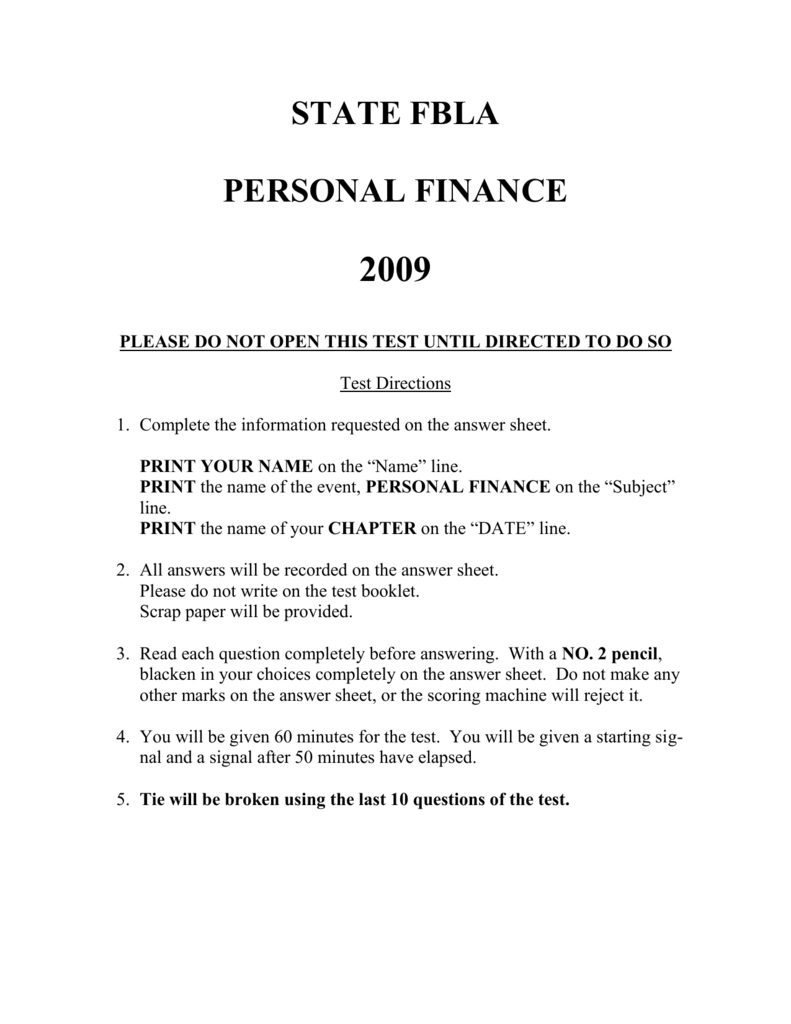Absolutely! Here’s a 3000-word article designed to mimic a personal finance FBLA practice test, with list items converted to headings for a more structured and exam-like feel.
Welcome to this comprehensive practice test designed to help you prepare for the FBLA (Future Business Leaders of America) personal finance competition. Understanding personal finance is crucial for your future success, and this test will cover a wide range of topics, from budgeting and saving to investing and credit management. Let’s dive in and test your financial acumen.

1. Understanding the Importance of Budgeting
Budgeting is the cornerstone of effective personal finance. It allows you to track your income and expenses, ensuring that you live within your means and achieve your financial goals.
2. Creating a Realistic Budget
Step 1: Calculate Your Income: This includes all sources of income, such as salary, investments, and side hustles.
3. The Difference Between Fixed and Variable Expenses
Fixed expenses are those that remain consistent from month to month, such as rent or mortgage payments.
4. The Concept of Net Worth
Net worth is the difference between your assets (what you own) and your liabilities (what you owe). It’s a key indicator of your financial health.
5. Setting SMART Financial Goals
Specific: Clearly define what you want to achieve.
6. The Power of Compound Interest
Compound interest is the interest earned on both your initial deposit and the accumulated interest. It’s a powerful tool for growing your wealth over time.
7. Different Types of Savings Accounts

Regular Savings Accounts: Offer basic interest rates and easy access to funds.
8. Understanding Investment Risk and Return
Higher returns typically come with higher risks. It’s essential to understand your risk tolerance before making investment decisions.
9. Diversification in Investing
Diversification involves spreading your investments across different asset classes to reduce risk.
10. Types of Investments
Stocks: Represent ownership in a company.
11. Retirement Savings Plans
401(k) Plans: Employer-sponsored retirement plans that offer tax advantages.
12. Understanding Credit Scores
Credit scores are numerical representations of your creditworthiness. They play a crucial role in determining your eligibility for loans and credit cards.
13. Factors That Affect Credit Scores
Payment History: Your record of paying bills on time.
14. The Importance of Checking Your Credit Report
Regularly checking your credit report allows you to identify and correct any errors that could negatively impact your score.
15. Types of Debt
Good Debt: Debt that appreciates in value or generates income, such as student loans or mortgages.
16. Strategies for Managing Debt
Debt Snowball Method: Paying off the smallest debt first, then moving on to the next smallest.
17. Understanding Interest Rates
Interest rates are the cost of borrowing money. They can be fixed or variable.
18. The Impact of High-Interest Debt
High-interest debt, such as credit card debt, can quickly accumulate and become difficult to manage.
19. Avoiding Common Credit Mistakes
Late Payments: Paying bills late can negatively impact your credit score.
20. Types of Insurance
Health Insurance: Covers medical expenses.
21. The Importance of Insurance
Insurance protects you from unexpected financial losses and provides peace of mind.
22. Understanding Insurance Premiums and Deductibles
Premiums: The amount you pay for insurance coverage.
23. Risk Management Strategies
Risk Avoidance: Avoiding activities that could lead to losses.
24. Understanding Basic Economic Concepts
Supply and Demand: The forces that determine prices in a market economy.
25. The Role of the Federal Reserve
The Federal Reserve is the central bank of the United States. It plays a crucial role in regulating the economy and controlling inflation.
26. Consumer Rights and Responsibilities
Consumers have the right to safe products, accurate information, and fair treatment. They also have the responsibility to make informed decisions and use products safely.
27. Financial Literacy and Its Importance
Financial literacy is the ability to understand and effectively use various financial skills, including personal financial management, budgeting, and investing. It’s essential for making informed financial decisions.
28. The Impact of Taxes on Personal Finance
Taxes can significantly impact your income and investments. Understanding tax laws and regulations is crucial for effective financial planning.
29. Understanding Paychecks and Deductions
Paychecks include gross pay, deductions (such as taxes and insurance), and net pay (take-home pay). Understanding your paycheck is essential for budgeting.
30. Staying Informed About Financial News
Staying informed about financial news and trends can help you make better financial decisions.
This practice test has covered a wide range of personal finance topics. By understanding these concepts and applying them to your own financial situation, you can build a solid foundation for a successful financial future. Good luck with your FBLA competition!
